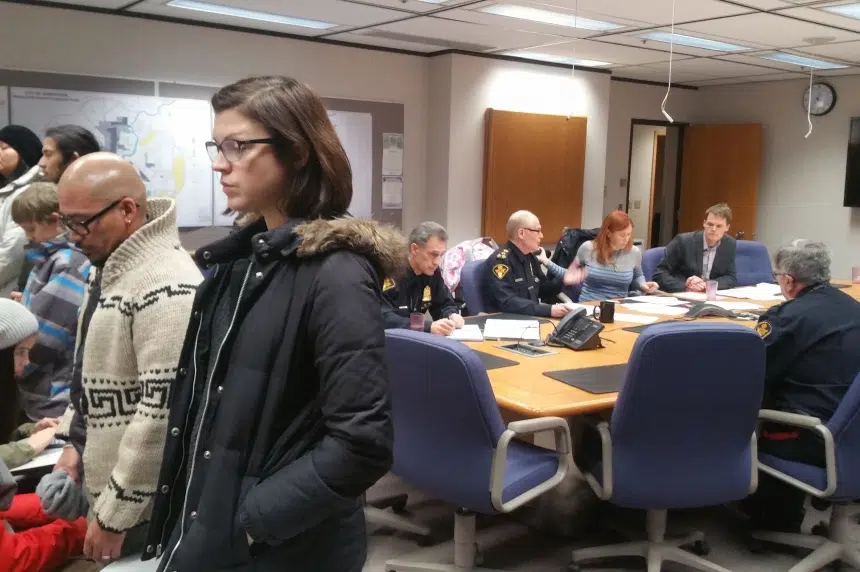Some call it carding, the Saskatoon Police Service calls it street checks — either way, the issue of police stopping people on the street has become the subject of debate as authorities grapple with creating a policy on the issue.
On Thursday, Saskatoon Police Chief Clive Weighill delivered a report on the subject during a meeting of the Saskatoon Board of Police Commissioners. Weighill told the board he had attended a meeting with provincial officials from the Saskatchewan Police Commission. He said the province is taking the first steps at coming up with a policy on the issue as it watches a similar process unfold in Ontario.
The chief was interrupted briefly by demonstrators from the Saskatoon Co-ordinating Committee Against Police Violence. Six people stood in the audience of the meeting room and turned their backs as Weighill made his presentation. The protestors filed out of the room after Mayor Don Atchison, who serves as the board chair, asked them to either sit down or leave.
Demonstator Kota Kimura said the group believes police street checks disproportionally target poor people and aboriginals. He repeated a call for the practice to be done away with entirely. He said the group wants a third-party review of police carding, and plans to conduct its own research.
Eileen Bear was also among the protestors. She said she was stopped by police on 20th Street one morning near St. Paul’s hospital.
“I was walking to a knitting class, I just started learning how to knit through our parish and we were knitting prayer shawls for the elderly and sick in our community,” she explained.
She said a police car pulled up to her, but she couldn’t make out what the officer was saying at first because she had headphones on.
“I saw his mouth moving and I took the earbud out of my ear and looked at him and he says: ‘you look like someone we might be looking for,’ and I said; ‘no, I don’t think so’ and I just put the earbud back in and I walked across the street.
She said one of the officers got out of the cruiser and followed her, asking her name.
“And then he said ‘well, I just want to search you’ and I said ‘no,’ and I know that male officers aren’t allowed to search females, and so I said ‘no, you’re not touching me’ and I put my hands up and I backed away from him,” she said.
From there, Bear said the first officer demanded her name again, as his partner got out of the the cruiser.
“I got really scared and felt very intimidated. And he had said: ‘what’s your name?’ and I said: ‘it’s Eileen Bear,’ and he looked at me and said: ‘There now, was that so hard?'”
She told reporters outside Thursday’s board meeting why she thinks she was singled out.
“I just got out of the shower. I was wearing sweat pants and a hoodie and a toque, because it was cold and my hair was wet. And race,” she said.
Police chief responds to concerns
Speaking after the meeting, Weighill said he was disappointed the demonstrators opted to leave, rather than listen to the proceedings.
“The mayor asked them to sit down and be part of the meetingand they were certainly more than welcome. I don’t think it solves anything when people are turning their backs and not listening to the conversation. We’re all trying to work our way through this,” he said.
Weighill said he wants the police service to be sensitive to concerns, but he stood by the need for his officers to approach people in their work.
“There’s no doubt about it, sometimes people are very innocent. They’re walking along and the police are asking them what they’re doing, right?” he said.
Weighill said there are two sides to the issue, though.
“For instance, we’ve had a rash of break-and-enters of garages and sheds in Sutherland. So we asked our officers, ‘okay, when you’re out there at night, if you see someone that’s walking around the back alleys that’s suspicious, stop and ask them what they’re doing.’ If there’s a rash of crime in that area, I think that’s what we have to do,” he said.
Thursday’s board meeting was among the first steps in coming up with an official policy. He said he expects more discussion at the Board of Police Commissioners in coming months, as well as public consultations and further talks with the province.
“The board’s having a discussion on it. We’re trying to find out how we’re going to go about this. We’re talking about getting the Saskatchewan Police Commission involved. We’re talking about formulating some policies and to me, that’s very positive. But the people that are not happy with what we’re doing aren’t hearing that, and it’s not helping the conversation any,” he said.







